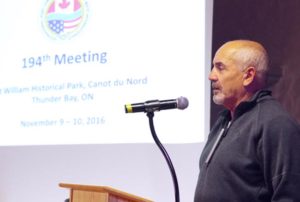‘We are water, the water unites us’ states Water Walker Josephine Mandamin

By Rick Garrick
THUNDER BAY—The Indigenous knowledge shared at the International Joint Commission’s (IJC) Great Lakes Water Quality Board 194th Meeting in Thunder Bay was a highlight for Water Walker Josephine Mandamin.
“It was a good learning experience for all of us, not only for us but the IJC and the people that are here,” says the Wikwemikong citizen who performed the opening and closing prayers at the Nov. 9-10 meeting.
“It was really quite the experience for them to hear about the Indigenous learning [and] traditional environmental knowledge that we shared with them. I hope in the future that they can still share what they learned today, to share with themselves and their families.”
Mandamin says it is important for people to learn and share the traditional environmental knowledge.
“We have to work together,” Mandamin says. “We are of water, the water unites us and we have to be united in the work that we do in the future, not only for our future but for our [future] generations of children. Our children and their children also have to learn to work together.”
The meeting was held at Fort William Historical Park with sessions on National Perspectives on Aboriginal and Tribal Matters, Traditional Ecological Knowledge, Regional Perspectives, Local Perspectives and a Panel Discussion focused on Indigenous people’s perspectives on the Great Lakes and specifically Lake Superior. IJC representatives from the United States and Canada attended the meeting along with local representatives, including Robinson Superior Regional Grand Chief Pierre Pelletier and Red Rock Indian Band Chief Edward Wawia.
“Everybody here, we’re all on the same page with regards to how important water is and the vital role it plays in everybody’s life,” Pelletier says, noting that the Robinson Superior treaty is based on all of the water flowing into Lake Superior. “So it really is fitting that we have somebody here to express our concerns and everything about the water.”
Pelletier says there have been many resource developments over the years that have left scars on Lake Superior and Lake Nipigon.
“Now we have to work together to try to clean it up the best that we can to get the whole watershed back to the way it was years ago,” Pelletier says. “There’s a lot of hydro dams on the system that won’t be taken down or moved, but I think the major part is that we need to work as hard as we can to get everything into the pristine condition it [once was].”
Pelletier says he was involved in the forest industry since the early 1970’s.
“It looks good, it’s cleaned up a lot better,” Pelletier says about the water. “And over time it will replenish itself.”
Pays Plat’s Debbie King delivered a presentation on the community’s source water protection plan which was implemented a few years ago using both traditional knowledge and western science.
“The first part of the process we did was [having] community interviews to identify issues regarding the water surrounding us and any changes that have been noticed over the years,” King says. “The next step I did was delineating the watershed around Pays Plat Lake. This is the lake that feeds into Lake Superior, which is our main source water.”
King says the community also developed an advisory board to identify all of the threats to the community’s water supply.
“And then we did research on how to remediate these threats and the costs associated with that,” King says. “That’s where we are right now. We’re trying to secure funding to begin purchasing items like a larger spills kit, containment booms for the river, water intake zone signs. We’d like to do an on-site sewage systems study and also we’d like to see some landfill site upgrades.”


